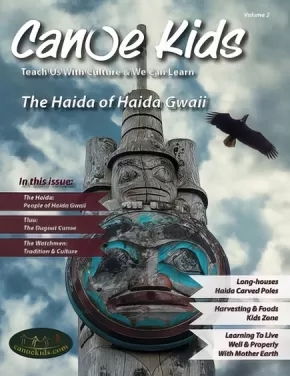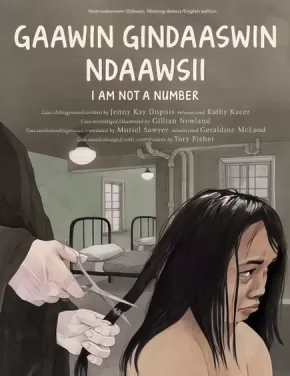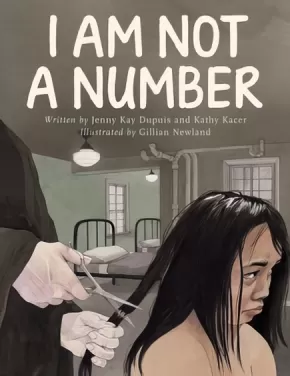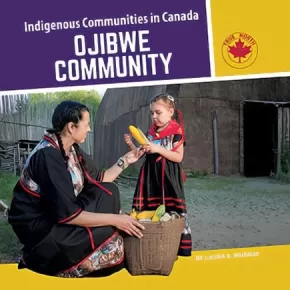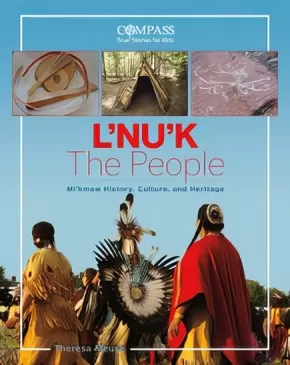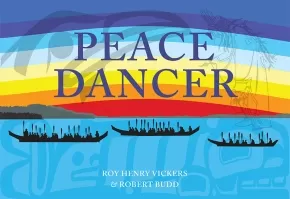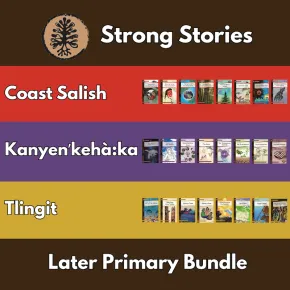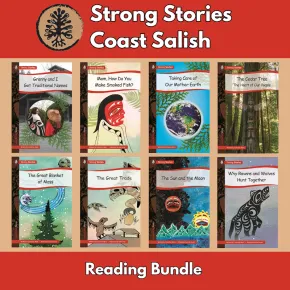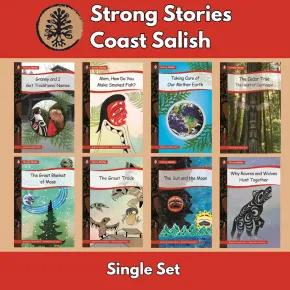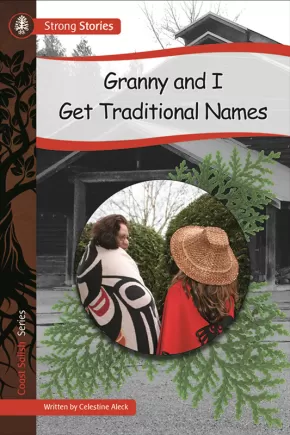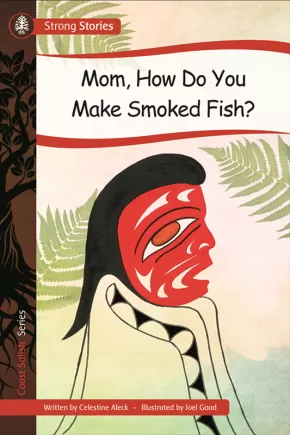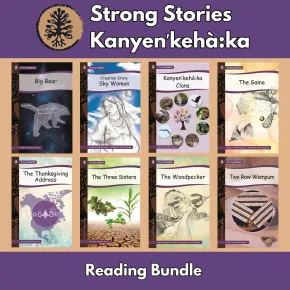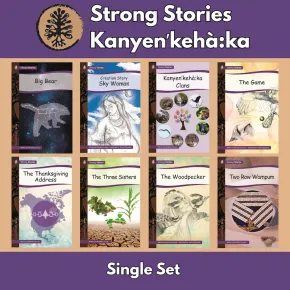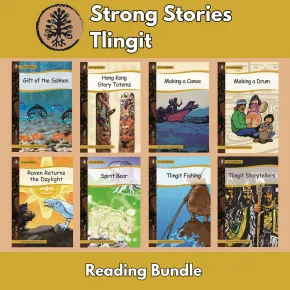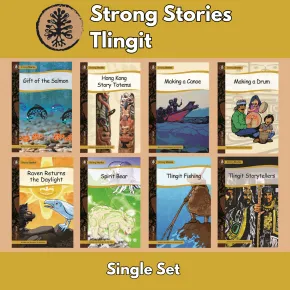
First Nations
151
-
165
of
204 Results;
Sort By
Go To
of 14
Canoe Kids Volume 2: The Haida of Haida Gwaii
$22.95
Format:
Paperback
Text Content Territories:
Indigenous Canadian; First Nations; Haida;
ISBN / Barcode: 9781926852089
Synopsis:
Synopsis:
Canoe Kids Vol. 2 The Haida is the second issue of a 24 edition series designed as family books for kids all ages. This eight-year project will see the Canoe Kids Team embed with 24 Peoples the publication designed as a family book for kids all ages. The mandate for the full-colour book (197 full colour high res photographs) is Exploring Indigenous Cultures through Authentic Indigenous Voices. The publication balances culture, equity and the environment in a beautiful mix that reminds the reader of the pictorial quality of National Geographic with a more in depth editorial content.
This second issue focuses on the Haida Nation of Haida Gwaii. In 165 pages the reader is introduced to the Haida People who kindly assisted the Canoe Kids staff by allowing access to Haida territory. Canoe Kids acknowledges the generosity of the Council of Haida Nation, the Haida Museum and the Haida Heritage Centre.
Educator Information
Each edition follows a common theme and features:
1: Compelling and beautiful pictorials that draw you into the stories and place of the featured community
2: The story of the vessel used by the featured Peoples
3: Art and Food
4: A Kids Zone
5: Resources for kids, parents and educators
6: Stories by and of the featured Peoples in each edition
7: Extraordinary pictures of the lives, land and waters of the featured Peoples
The materials are equal parts cultural and environmental. The latter is a natural offshoot of the former as Indigenous cultures are wrapped around and through the lands and water and sky both spiritually and from a harvesting and gathering perspective. Indigenous Peoples have long been the caretakers of Mother Earth and we can all learn from these experts whose message is perhaps more relevant today than ever.
Indigenous communities have always included the little ones in their circles and talk and teach to them in the same way they talk and teach to young adults and adults. Canoe Kids decided to follow that inclusive way of life for the layout of each book. Rather than create editions for different age groups, Canoe Kids decided to have one book for all ages.
K through 3 use Canoe Kids to read beautiful and ancient stories. There is beautiful original art to explore and a Kids Zone with puzzles, word searches, colouring, cutouts and more. Mid grades use the materials to study the culture, food and wildlife of the featured cultures. Grades 8 through 12 use stories that are more in depth from Dr. David Suzuki about the environment and there are discussion articles about living well and properly with Mother Nature as well as articles about the history and geography of the featured People.
Additional Information
165 pages | 8.50" x 11.00"
Gaawin Gindaaswin Ndaawsii / I Am Not A Number
$14.95
Artists:
Format:
Paperback
Text Content Territories:
Indigenous Canadian; First Nations; Anishinaabeg; Ojibway;
ISBN / Barcode: 9781772600995
Synopsis:
Synopsis:
Dual language edition of powerful children's book about residential school experience reflects Indigenous language revitalization.
The dual language edition, in Nishnaabemwin (Ojibwe) Nbisiing dialect and English, of the award-winning I Am Not a Number. When eight-year-old Irene is removed from her First Nations family to live in a residential school she is confused, frightened, and terribly homesick. She tries to remember who she is and where she came from, despite the efforts of the nuns who are in charge at the school and who tell her that she is not to use her own name but instead use the number they have assigned to her. When she goes home for summer holidays, Irene's parents decide never to send her and her brothers away again. But where will they hide? And what will happen when her parents disobey the law? Based on the life of co-author Jenny Kay Dupuis’ grandmother, I Am Not a Number is a hugely necessary book that brings a terrible part of Canada’s history to light in a way that children can learn from and relate to.
Reviews
"Residential and boarding school stories are hard to read, but they're vitally important... books like I Am Not a Number should be taught in schools in Canada, and the U.S., too."— Debbie Reese, American Indians in Children's Literature
"It’s important to teach children about true Canadian history, but it’s not easy to talk about it in a way that children will understand. I Am Not a Number is perfect to get the conversation about residential schools started with your children. It opens the door for them to ask questions about the subject and the story is relatable in a way they can follow."— Residential School Magazine
Educator Information
Recommended Ages: 7-11
Guided Reading: V
Dual-language: Nishnaabemwin (Ojibwe) Nbisiing dialect and English.
Subjects: Character Education (Empathy, Prejudice & Tolerance); History & Social Studies (Canadian History, First Nations & Indigenous Peoples); Government & Citizenship; Reflecting Diversity
This resource is also available in English: I Am Not a Number.
This resource is also available in French: Je ne suis pas un numero.
Additional Information
44 pages | 8.50" x 11.00" | Translated by Muriel Sawyer and Geraldine McLeod with contributions by Tory Fisher
I Am Not a Number
$19.95
Artists:
Format:
Hardcover
Text Content Territories:
Indigenous Canadian; First Nations; Anishinaabeg; Ojibway;
ISBN / Barcode: 9781927583944
Synopsis:
Synopsis:
When eight-year-old Irene is removed from her First Nations family to live in a residential school she is confused, frightened, and terribly homesick. She tries to remember who she is and where she came from, despite the efforts of the nuns who are in charge at the school and who tell her that she is not to use her own name but instead use the number they have assigned to her. When she goes home for summer holidays, Irene's parents decide never to send her and her brothers away again. But where will they hide? And what will happen when her parents disobey the law? Based on the life of co-author Jenny Kay Dupuis’ grandmother, I Am Not a Number is a hugely necessary book that brings a terrible part of Canada’s history to light in a way that children can learn from and relate to.
Awards
- 2018 Red Cedar Award for Information Book Winner
- 2018 Hackmatack Award Winner
Reviews
"Residential and boarding school stories are hard to read, but they're vitally important... books like I Am Not a Number should be taught in schools in Canada, and the U.S., too."— Debbie Reese, American Indians in Children's Literature
"It’s important to teach children about true Canadian history, but it’s not easy to talk about it in a way that children will understand. I Am Not a Number is perfect to get the conversation about residential schools started with your children. It opens the door for them to ask questions about the subject and the story is relatable in a way they can follow."— Residential School Magazine
"[A] powerful teaching tool that brings a terrible part of Canada’s history to light in a way that children can learn from and relate to. It is written in simple language and told in a way that will stimulate conversations about residential schools and the traumatic effects they have had on generations of First Nation families and communities. ... beautifully illustrated by Gillian Newland. She captures the somber mood of the school, the anguish of the children, the severity of the nuns and the desperation of the family. Students can easily empathize with Irene and her brothers as well as their parents as they try to imagine how they would feel or act in a similar situation." — Alberta Native News, December 2016
"Endless cross-curricular connections can be made using this story. But the most powerful aspect of this book is that it will open a dialogue, one that Justice Murray Sinclair spoke of as head of the Truth and Reconciliation Commission, a dialogue that needs to take place for reconciliation to happen." — ETFO Voice
Educator Information
Recommended Ages: 7-11
Guided Reading: V
This resource is also available in a dual-language format (English and Nishnaabemwin (Ojibwe) Nbisiing dialect): Gaawin Gindaaswin Ndaawsii / I Am Not A Number.
This resource is also available in French: Je ne suis pas un numero
Additional Information
32 pages | 8.50" x 11.00"
Indigenous Communities in Canada: Ojibwe Community (3 in Stock)
$14.95
Format:
Paperback
Text Content Territories:
Indigenous Canadian; First Nations; Anishinaabeg; Ojibway;
ISBN / Barcode: 9781773080321
Synopsis:
Synopsis:
Ojibwe traditionally moved as the season changed but today many live across the country. Learn about Ojibwe traditional ways of life and how they respect their traditions in modern Canada.
Educator & Series Information
This book is part of the Indigenous Communities in Canada series.
Additional Information
24 Pages
L'nu'k: The People: Mi'kmaw History, Culture and Heritage
$19.95
Format:
Paperback
Text Content Territories:
Indigenous Canadian; First Nations; Mi'kmaq;
ISBN / Barcode: 9781771084529
Synopsis:
Synopsis:
The Mi'kmaq lived in Canada long before the country even got its name. Before Europeans arrived, they lived in homes called wigwams and hunted and fished throughout the Maritime provinces, living off and giving back to the land. They enjoyed storytelling, drumming, and dancing within their tightknit communities.
In L'nuk: the Mi'kmaq of Atlantic Canada, First Nations educator Theresa Meuse traces the incredible lineage of today's Mi'kmaq people, sharing the fascinating details behind their customs, traditions, and history. Discover the proper way to make Luski (Mi'kmaw bread), the technique required for intricate quillwork and canoebuilding, what happens at a powwow, and how North America earned its Aboriginal name, Turtle Island.
Educator Information
Includes informative sidebars, highlighted glossary terms, recommended reading, a historic timeline, index, and over 60 fullcolour historical and contemporary images.
Recommended for Grades 5-12 for these subject areas: Social Studies.
Additional Information
128 pages | 6.75" x 8.50"
Peace Dancer
$19.95
Text Content Territories:
Indigenous Canadian; First Nations; Tsimshian (Ts'msysen);
ISBN / Barcode: 9781550177398
Synopsis:
Synopsis:
The children of the Tsimshian village of Kitkatla love to play at being hunters, eager for their turn to join the grown-ups. But when they capture and mistreat a crow, the Chief of the Heavens, angered at their disrespect, brings down a powerful storm.
The rain floods the Earth and villagers have no choice but to abandon their homes and flee to their canoes. As the seas rise, the villagers tie themselves to the top of Anchor Mountain, where they pray for days on end and promise to teach their children to value all life. The storm stops and the waters recede. From that point on, the villagers appoint a chief to perform the Peace Dance at every potlatch and, with it, pass on the story of the flood and the importance of respect.
With eighteen new illustrations from Roy Henry Vickers and exceptional narrative, Peace Dancer will delight readers of all ages and add to the collection of global flood stories.
Reviews
"Parents and teachers will enjoy sharing Peace Dancer with children. Highly recommended." — Dr. Gregory Bryan, CM Magazine, October 2016
Educator & Series Information
This book is part of the Northwest Coast Legends series.
This book is part of the Northwest Coast Legends series.
Other books in this series include:
Raven Brings the Light
Cloudwalker
Orca Chief
Peace Dancer
Raven Brings the Light
Cloudwalker
Orca Chief
Peace Dancer
Recommended for ages 3 to 6.
Additional Information
40 pages | 12.00" x 8.25"
Strong Stories - Later Primary includes Coast Salish, Kanyen’keha:ka and Tlingit - Single Set Bundle
 $214.92 $238.80
$214.92 $238.80

ISBN / Barcode: 9781771746717
Synopsis:
Synopsis:
This Later Pimary bundle features one copy each of three Strong Stories sets: Coast Salish, Kanyen’keha:ka and Tlingit (24 books total).
Coast Salish Strong Stories written by Celestine Aleck include the following:
Granny and I Get Traditional Names
Mom, How Do You Make Smoked Fish?
Why Ravens and Wolves Hunt Together
Taking Care of Our Mother Earth
The Cedar Tree: The Heart of Our People
The Great Blanket of Moss
The Great Trade
The Sun and the Moon
Kanyen’keha:ka Strong Stories written by Michelle Corneau include the following:
Big Bear
Kanyen’kehà:ka Clans
Creation Story Sky Woman
The Thanksgiving Address
The Game
The Three Sisters
The Woodpecker
Two Row Wampum
Tlingit Strong Stories written by Bill Helin include the following:
Gift of the Salmon
Hong Kong Story Totems
Making a Canoe
Making a Drum
Raven Returns the Daylight
Spirit Bear
Tlingit Fishing
Tlingit Storytellers
Reading levels span end grade 2, grade 3 and beginning grade 4.
Additional Information
ISBN: 9781771746717
Strong Stories Coast Salish - Reading Bundle
 $429.84 $477.60
$429.84 $477.60

Text Content Territories:
Indigenous American; Native American; Salish; Coast Salish; Indigenous Canadian; First Nations; Salish; Coast Salish;
ISBN / Barcode: 9781771746724
Synopsis:
Synopsis:
This bundle includes all 8 titles, 6 of each, in the Strong Stories Coast Salish series (48 books total).
Coast Salish Strong Stories written by Celestine Aleck include the following:
Granny and I Get Traditional Names
Mom, How Do You Make Smoked Fish?
Why Ravens and Wolves Hunt Together
Taking Care of Our Mother Earth
The Cedar Tree: The Heart of Our People
The Great Blanket of Moss
The Great Trade
The Sun and the Moon
This resource is also available in French HERE!
Additional Information
ISBN: 9781771746724
Strong Stories Coast Salish - Single Set Bundle
 $71.64 $79.60
$71.64 $79.60

Text Content Territories:
Indigenous American; Native American; Salish; Coast Salish; Indigenous Canadian; First Nations; Salish; Coast Salish;
ISBN / Barcode: 9781771745741
Synopsis:
Synopsis:
Own the entire set of Coast Salish Strong Stories written by Celestine Aleck!
Included in this set is one copy of each of the following:
Granny and I Get Traditional Names
Mom, How Do You Make Smoked Fish?
Why Ravens and Wolves Hunt Together
Taking Care of Our Mother Earth
The Cedar Tree: The Heart of Our People
The Great Blanket of Moss
The Great Trade
The Sun and the Moon
This resource is also available in French HERE!
Additional Information
ISBN: 9781771745741
Strong Stories Coast Salish: Granny and I Get Traditional Names
 $9.95
$9.95

Format:
Paperback
Text Content Territories:
Indigenous American; Native American; Salish; Coast Salish; Indigenous Canadian; First Nations; Salish; Coast Salish;
ISBN / Barcode: 9781771741279
Synopsis:
Synopsis:
In this Coast Salish story, told in the voice of a young girl, she describes how she and her Granny get ready for their naming ceremony. When the special day arrives, the Longhouse fills with people who will witness and celebrate the sharing of their traditional names.
Educator & Series Information
This book is part of the Strong Stories: Coast Salish series. Strong Stories focus on different First Nation territories from across Canada and the United States. These stories reflect the belief that our stories are the roots of our people, our lands and our cultures. It is from our stories that we grow and become strong and proud.
This resource is also available in French: Grand-maman et moi recevons des noms traditionnels.
Additional Information
16 pages | 6.00" x 9.00" | ISBN: 9781771741279
Strong Stories Coast Salish: Mom, How Do You Make Smoked Fish?
 $9.95
$9.95

Artists:
Format:
Paperback
Text Content Territories:
Indigenous Canadian; First Nations; Salish; Coast Salish; Indigenous American; Native American; Salish; Coast Salish;
ISBN / Barcode: 9781771741224
Synopsis:
Synopsis:
In this Coast Salish story, step-by-step instructions for gathering wood and catching, filleting and then smoking fish are given. The text and illustrations support the reader’s understanding of the process and emphasize the respect shown by the Coast Salish people for the circle of life.
Educator & Series Information
This book is part of the Strong Stories: Coast Salish series. Strong Stories focus on different First Nation territories from across Canada and the United States. These stories reflect the belief that our stories are the roots of our people, our lands and our cultures. It is from our stories that we grow and become strong and proud.
This resource is also available in French: Maman, comment fait-on du poisson fumé ?
Additional Information
16 pages | 6.00" x 9.00" | ISBN: 9781771741224
Strong Stories Kanyen'keha:ka - Reading Bundle
 $429.84 $477.60
$429.84 $477.60

Text Content Territories:
Indigenous American; Native American; Haudenosaunee (Iroquois); Kanyen'keha:ka (Mohawk); Indigenous Canadian; First Nations; Haudenosaunee (Iroquois); Kanyen'keha:ka (Mohawk);
Reading Level: 2-4
ISBN / Barcode: 9781771746731
Synopsis:
Synopsis:
Bundle includes all 8 titles, 6 of each, in the Strong Stories Kanyen'kehà:ka series (48 books total).
Kanyen’keha:ka Strong Stories written by Michelle Corneau include the following:
Big Bear
Kanyen’kehà:ka Clans
Creation Story Sky Woman
The Thanksgiving Address
The Game
The Three Sisters
The Woodpecker
Two Row Wampum
This bundle is also available in French HERE!
Additional Information
ISBN: 9781771746731
Strong Stories Kanyen'keha:ka - Single Set Bundle
 $71.64 $79.60
$71.64 $79.60

Text Content Territories:
Indigenous American; Native American; Haudenosaunee (Iroquois); Kanyen'keha:ka (Mohawk); Indigenous Canadian; First Nations; Haudenosaunee (Iroquois); Kanyen'keha:ka (Mohawk);
ISBN / Barcode: 9781771745833
Synopsis:
Synopsis:
Own the entire set of Kanyen’keha:ka Strong Stories written by Michelle Corneau! (8 books total)
Included is one copy of each of the following books:
Big Bear
Kanyen’kehà:ka Clans
Creation Story Sky Woman
The Thanksgiving Address
The Game
The Three Sisters
The Woodpecker
Two Row Wampum
This resource is also available in French HERE!
Additional Information
ISBN: 9781771745833
Strong Stories Tlingit - Reading Bundle
 $429.84 $477.60
$429.84 $477.60

Text Content Territories:
Indigenous American; Alaska Native; Tlingit; Indigenous Canadian; First Nations; Tlingit;
Reading Level: 2-4
ISBN / Barcode: 9781771746748
Synopsis:
Synopsis:
Bundle includes all 8 titles, 6 of each, in the Strong Stories Tlingit series (48 books total).
Tlingit Strong Stories written and illustrated by Bill Helin include the following:
Gift of the Salmon
Hong Kong Story Totems
Making a Canoe
Making a Drum
Raven Returns the Daylight
Spirit Bear
Tlingit Fishing
Tlingit Storytellers
This resource is also available in French HERE!
Additional Information
ISBN: 9781771746748
Strong Stories Tlingit - Single Set Bundle
 $71.64 $79.60
$71.64 $79.60

Text Content Territories:
Indigenous American; Alaska Native; Tlingit; Indigenous Canadian; First Nations; Tlingit;
ISBN / Barcode: 9781771745956
Synopsis:
Synopsis:
Own the entire set of Tlingit Strong Stories written by Bill Helin! (8 books total)
Included is one copy of each of the following:
Gift of the Salmon
Hong Kong Story Totems
Making a Canoe
Making a Drum
Raven Returns the Daylight
Spirit Bear
Tlingit Fishing
Tlingit Storytellers
This resource is also available in French HERE!
Additional Information
ISBN: 9781771745956
Sort By
Go To
of 14

